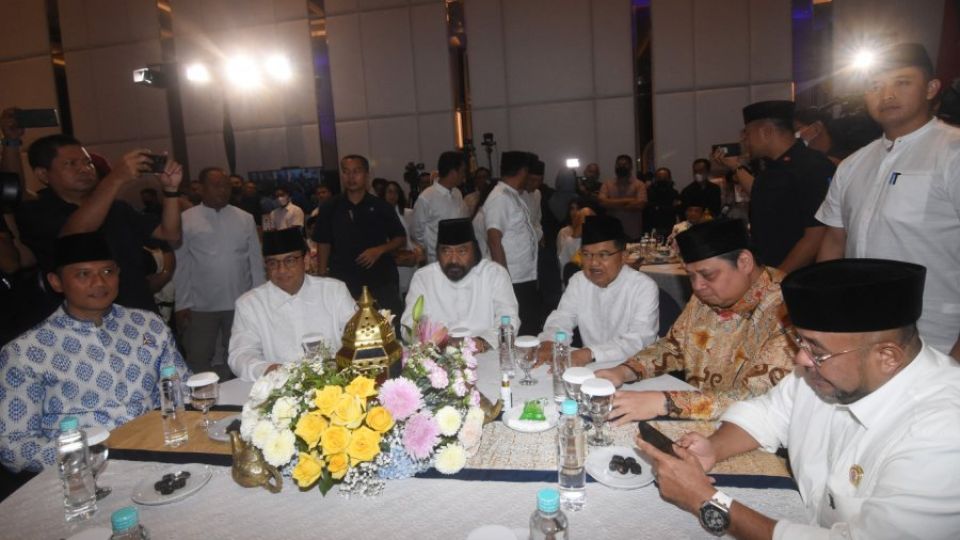March 30, 2023
JAKARTA – Hotels and restaurants are up in arms over the recently imposed ban on iftar gatherings for government workers, arguing that the sunset events are one of the sure-fire sources of income during the fasting month, when the industry normally struggles with low occupancy levels.
Indonesian Hotel and Restaurant Association (PHRI) secretary-general Maulana ‘Alan’ Yusran said income from iftar feasts was “not big” but nevertheless of great importance to keep operations going during Ramadan, given that activity ebbed during the fasting month and hotels could not bank on high occupancy.
“Ramadan is always very tough for us, because anything we try [to attract customers] does not translate to conversion, as there is generally less activity during Ramadan, both from the government and the private sector, and things only start to pick up again on the second day of Idul Fitri,” Alan told The Jakarta Post on Tuesday.
Alan said iftar ban dealt a heavy blow to the industry.
Two days before the start of Ramadan, President Joko "Jokowi" Widodo issued a circular barring government employees from holding iftar gatherings, saying the move was necessary as the country had yet to transition from the coronavirus pandemic to the endemic stage.
The country's last remaining COVID-19 restrictions had been lifted in January.
The ban prompted fierce rejection, with critics pointing out that other events, such as concerts and the wedding of Jokowi’s son, were not subject to similar restrictions.
Cabinet Secretary Pramono Agung clarified in a public statement on March 23 that the directive did not apply to the general public but only to government ministers and agency heads.
Pramono said the directive was motivated by the recent barrage of criticism directed at government officials for flaunting their wealth on social media.
"Government workers are currently under this glaring spotlight, and because of that, the President calls on members of the civil service to break the fast in a modest way and not invite senior government officials to the event," Pramono said.
Read also: Iftar ban for public servants sparks backlash
Scrutinizing that reasoning, Alan said the policy would negatively affect regional economies in particular, as “they need this circulation of money” the most.
He noted that private sector iftar gatherings, which are still allowed, meant the impact would be less severe for hotels in the commercial centers of Java, but those operating in other regions would not get much of the pie from big corporate events.
“I think this policy is [too Jakarta-centric],” said Alan.
“It is true that, in terms of income, [iftar dinners] are not comparable with income from outside Ramadan. But they can support [hotels], especially given that operational costs in Ramadan are high as we have to pay out holiday bonuses on top of the fixed costs,” he explained.
Alan said the ban subjected the hotel industry to a drought this Ramadan, as vanishing room bookings meant hotels normally relied heavily on income from government-held iftar feasts during the fasting month.
“When this wheel of the economy stops spinning, this will also affect the micro, small and medium enterprises [MSMEs]. On top of employing many people, don’t forget hotels also rely on MSMEs for supplies,” said Alan.
Josua Pardede, chief economist at publicly listed Bank Permata, told the Post on Tuesday that the iftar ban would hurt the income of Indonesian hotels and restaurants and their food and beverage suppliers, though only to some extent.
“There is a potential for decreased income due to [this ban]. However, we see that other income [sources], such as iftar feasts from the private sector or the general public, are not prohibited,” said Josua.
Josua said the ban would slow down the post-pandemic recovery of the hotel and restaurant industry yet not stop the momentum entirely, given that there were no mobility restrictions during Ramadan this year.
Read also: Iftar feasts show Ramadan is losing its spiritual values
Alan said the ban would certainly hamper the industry’s recovery.
Hotel occupancy in Indonesia has returned to or even surpassed pre-pandemic levels, but Alan said this was only thanks to improvements in Java and Kalimantan, with the latter benefiting from the project for Indonesia’s planned new capital city.
“Many other regions have not recovered in terms of occupancy,” Alan said.
The apparent recovery meant businesses in the industry could no longer take advantage of favorable loan restructuring terms offered during the pandemic, he noted, even though many properties were still short of cash reserves.
“So [they earn money] today just for today, and this month just for this month,” said Alan, “which does not allow [them] to build cash reserves, because the money is spent on operational costs. […] So, we can only expect a rebound after Idul Fitri,” he concluded.


